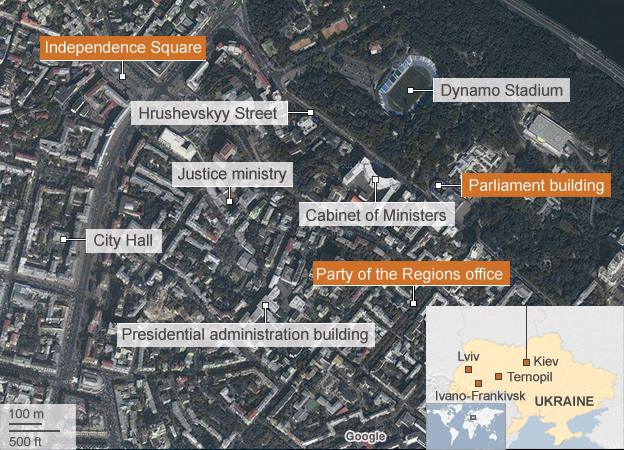Ukraine crisis: EU sanctions push over Kiev bloodshed
- Published
There have been sporadic clashes through the day, as Duncan Crawford reports
Europe's leaders are to consider urgent sanctions against Ukraine after the worst violence in months of unrest claimed at least 26 lives.
There were sporadic clashes on Wednesday following Tuesday night's police bid to dislodge protesters from their stronghold in the capital Kiev.
President Viktor Yanukovych blamed opposition leaders and Russia spoke of an attempted coup.
But the EU said it expected measures to target those behind the "repression".
European Commission President Jose Manuel Barroso spoke of the responsibility of "the political leadership, external" while several EU countries said they had no doubts that the Ukrainian authorities were to blame.
At a joint news conference, French President Francois Hollande said those responsible for the violence "will be sanctioned" at an emergency meeting due to take place on Thursday, while German Chancellor Angela Merkel echoed the threat, saying they were "side by side with the men and women who suffer".
Meanwhile Polish Deputy Foreign Minister Piotr Serafin said there was "complete consensus" among EU leaders about the need to introduce sanctions against Ukraine.
The foreign ministers of France, Germany and Poland are to meet in Kiev on Thursday to assess the situation before an EU meeting in Brussels to decide whether to impose sanctions against Ukraine, said French Foreign Minister Laurent Fabius.
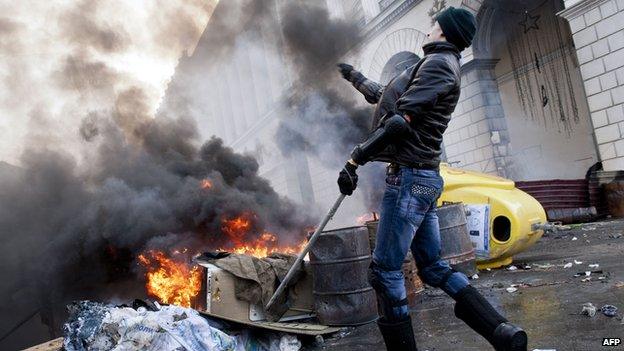
Clashes between protesters and police continued on Wednesday in Kiev
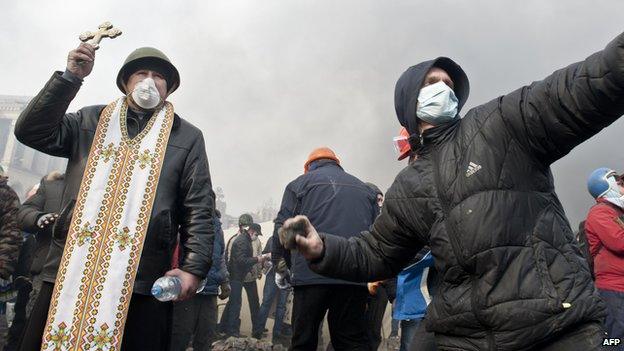
The protests have attracted Ukrainians from all walks of life
Ukraine's security service has announced a nationwide "anti-terrorist" operation to restore order, while the defence ministry said it was sending paratroopers to Kiev - to defend government offices and military installations, it stressed, and not to confront anti-government protesters.
Police have been trying to wrest control of Kiev's Independence Square, also known as the Maidan, which has been in the hands of protesters for several months.
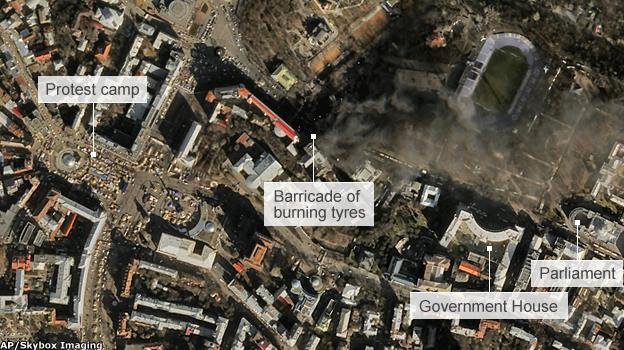
Satellite image showing smoke rising during Kiev clashes on 18 February
The protests began in late November, when President Yanukovych rejected a landmark association and trade deal with the EU in favour of closer ties with Russia.
Tensions had begun to subside as recently as Monday, when protesters ended their occupation of government buildings in return for an amnesty from prosecution.
But violence erupted outside parliament on Tuesday morning as government supporters blocked opposition attempts to scale back the president's constitutional powers. They argued more time was needed to discuss the proposals.
Correspondents say it is unclear what sparked the hours of clashes, with each side blaming the other.
Protesters accused pro-government agents provocateurs, known as "titushki", of inciting some of the violence while the government said radical Right Sector supporters were involved.
In apocalyptic scenes overnight, protesters hurled paving stones, fireworks and petrol bombs while police used water cannon and stun grenades. Both sides accused the other of using live ammunition.
On Wednesday, the violence subsided but there were still periodic clashes and protesters are reported to have seized the central post office.
The health minister says at least 600 people have been wounded, more than half of them police officers.
A doctor treating wounded protesters in hospital, Dr Olga Bogomolets, told the BBC: "Police are coming into the hospitals and they are trying to take the wounded people to prison."
She said hundreds of volunteers were guarding the hospitals in response.
The number of dead on both sides has climbed to 26 and it is feared the death toll could increase. They include:
Ten police officers, according to the interior ministry, two of them traffic officers
At least 14 protesters, many killed in the streets around the parliament
A journalist working for Russian-language newspaper Vesti, Vyacheslav Veremyi, who was pulled from a taxi by masked men and shot dead
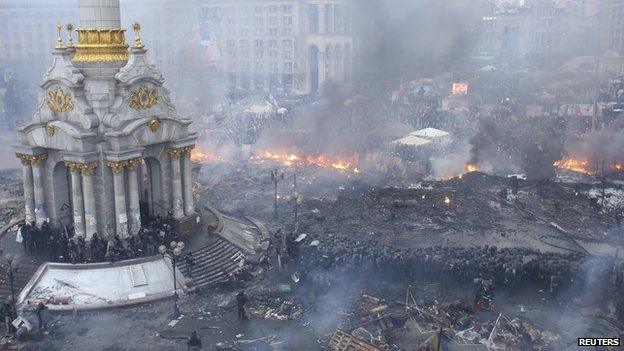
Kiev's Independence Square resembles a warzone
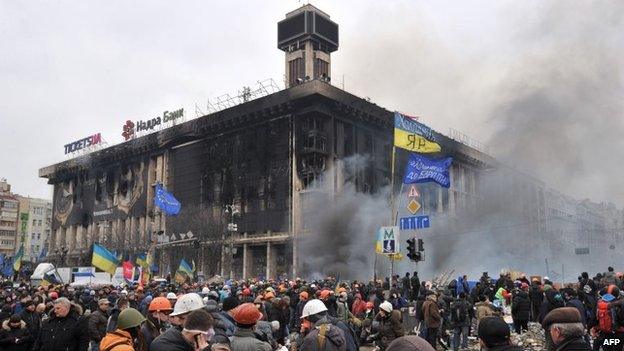
The charred edifice of the trade union building on Maidan Square is visible behind protesters. It was set alight late on Tuesday as clashes raged
Unrest is also reported outside Kiev, with a woman reportedly shot dead during an attempt to storm a building belonging to the security services in Khmelnytsky.
Police headquarters have been attacked in the western city of Lviv, where protesters are reported to have seized police cars and police weapons.
Protesters have also seized the regional administration headquarters in the city of Ivano-Frankivsk.
Local media reported that the police station in Ternopil, also in western Ukraine, had burned down after being set alight.
'Crossed the line'
Opposition leaders Vitaly Klitschko and Arseniy Yatsenyuk met President Yanukovych for late night talks but failed to come to an agreement.
In a statement, external broadcast on TV news channels on Wednesday morning, President Yanukovych said: "The opposition leaders have disregarded the principle of democracy according to which one obtains power not on the streets or maidans - but through elections.
"They have crossed the line by calling for people to take up arms."
He warned that those responsible for violence would face the law.
But the president added that there was a "better and more effective way" to solve the crisis, through dialogue and compromise.
Russia accused opposition protesters of trying to engineer a "violent takeover of power".
President Vladimir Putin's spokesman Dmitry Peskov said responsibility for the escalation of violence lay "specifically with extremists" whose actions could be seen as "an attempted coup d'etat".
Russian Foreign Minister Sergei Lavrov once again accused Western countries of encouraging "these acts of provocation. "
Mr Peskov refused to answer questions about when a second bailout instalment, promised by Moscow on Monday, would be released. Russia's $15bn (£9bn) bailout was seen as a reward for Mr Yanukovych's decision in November to pull out of the EU association deal.
"This is an island of freedom and we will defend it," said Mr Klitschko, the former boxer and leader of the Udar (Punch) party.
Mr Yatsenyuk, who heads the Fatherland party, appealed to President Yanukovych to "stop the bloodshed and call a truce".
One unifying Ukrainian voice emerged from the Winter Olympics in Sochi in the form of former pole vault champion Sergei Bubka.
Now head of Ukraine's Olympic Committee, he urged all sides to halt the violence that "puts our country on the brink of catastrophe".
